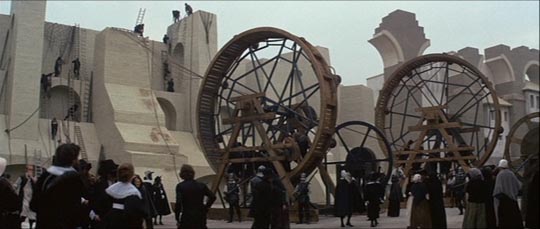WARNING: This post contains spoilers
On this date in film Catholic priest, Father Urbain Grandier (Oliver Reed) is alleged to have raped a nun in a fabricated written statement which is used to prove his guilt in The Devils (Ken Russell, 1971).
As part of Cardinal Richelieu’s (Christopher Logue) scheme to suppress the influence of feudal nobility in French towns, and to bring the fortified town of Loudun into the centralised fold, his representative Baron De Laubardemont (Dudley Sutton) seeks to undermine the authority of its new governor, Grandier.
Father Grandier is a conflicted man who is both devout in his attempts to protect Loudun from outside interference and a serial philanderer who is the object of nearly every woman’s desire in the town; when he is seen walking through the streets, one onlooker is heard saying, “There’s a man I wouldn’t mind going to hell for”. Grandier is well aware of his reputation as a vain, proud womaniser. However, when he encounters the beautiful and innocent Madeleine (Gemma Jones) he immediately falls in love with her, they marry, and he sees an opportunity at redemption.

notcoming.com
The news reaches reverend Mother, Sister Jeanne (a deliciously deranged performance by Vanessa Redgrave), who is sexually obsessed with the priest. The hunchbacked nun is prone to psycho-sexual fantasies where she imagines Grandier as Christ, a potent expression of her spiritual and carnal longing. On hearing of the marriage Jeanne, either as a calculated act of revenge or an involuntary hysteria-induced slip, accuses Grandier of witchcraft and of possessing her. The Baron seizes upon this which plants the seeds of Grandier’s ruin.
De Laubardemont summons an inquisitor (a wonderful, scenery-chewing turn by Michael Gothard) whose questionable ‘witch-hunting’ methods of forced enemas are put to use during Sister Jeanne’s show-exorcism. The brutality of the mock ritual awakens a madness in the other nuns. They strip off their garbs and run amok in the town’s cathedral in the throes of a religious frenzy, which is encouraged and exploited by the Baron and his conspirators, and culminates with the notorious ‘Rape of Christ’.
When Grandier and Madeleine return to the town, after visiting King Louis XIII beseeching him to protect Loudun, the priest is immediately arrested for heresy. The Baron gathers evidence for the trumped-up charges to condemn Grandier. He reads the forged statement, “And this said priest, Urbain Grandier, did debauch and defile my person six times between midnight and dawn on the night of May 13th in the year of our Lord, 1634.” He threatens a nun to sign it which seals Grandier’s fiery fate.

“Derek Jarman’s deliberately anachronistic set designs” via cageyfilms.com
The Devils is Russell’s masterpiece. Based on John Whiting’s play and inspired by real events documented in Aldous Huxley’s ‘The Devils of Loudun’, it is a fever dream of hot political and religious commentary that fell foul of the British Board of Film Classification’s regulations when it was released (‘Hell on Earth’, a 2002 television documentary presented by Mark Kermode, provides fascinating insights into how the film was received by censors, critics, cast and crew). The film’s striking visual and audio style is aided by Derek Jarman’s deliberately anachronistic set designs and Peter Maxwell Davies’s affecting atonal score. Russell’s intention for the viewing of the film to be like standing in “a public toilet” – somewhere you don’t want to stay for very long – seems to have been realised. However, while you’re watching The Devils, such is the sheer demented brio of its visualisation, it’s equally difficult to look away.
Adam Vaughan

